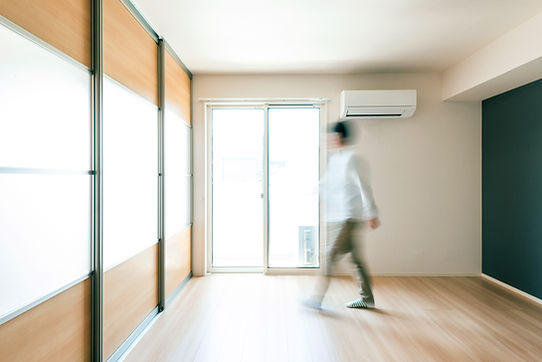

MS-RDK
Technology Logic &Evidence
Two main technical logics are used to give MS-RDK products great efficacy.
The effect of the MS-RDK installation is very effective.
Technology logic (1)
The round holes on MS-RDK generate turbulence without reducing the intake air volume, thereby preventing air stagnation behind the indoor unit's fan before heat exchange and smoothly feeding the airflow to the heat exchanger. (Analytical simulation of airflow conducted by the Nagoya Municipal Industrial Research Institute)
Simulation of airflow changes
The simulation shows that the velocity of the intake airflow drops, and stagnation is reduced after MS-RDK is installed.


Before installation
After installation
Intake air volume [m3/s]
Simulation of intake airflow changes
The graph shows that installation the MS-RDK does not lower the intake air volume or cause the air conditioning efficiency to drop.
Without MS-RDK
WITH MS-RDK
Technology logic (2)
MS-RDK, a high infrared radiation material, resonates and excites water molecules found in the air. These activated water molecules are miniaturized to promote phase change (vaporization). In addition, the generated turbulence increase the heat conductivity, and the larger heat flux increase the air conditioning efficiency.
14.5%
energy-reducing effect
Air-conditioning performance test based on JIS Standars
An energy-saving effect of 14.5% was confirmed in an air-conditioning performance test (using a Gas Heat Pump air conditioner (GHP)) based on JIS Standards at a major electric power company.
Indoor-side
air conditioner
Test unit
(Air conditioner indoor unit)
Test unit
(Air conditioner outdoor unit)
Outdoor-side
air conditioner
Intake temperature after installation
Thermography
The thermography images show that after installing MS-RDK, the blue and yellow areas are increasing, and cooling is progressing. (Approx. -2.7℃ drop)
<During cooling>


Before installation
After installation
After MS-RDK was installed, the indoor unit's heat exchange efficiency improved, and the blowout temperature increased from 47.4℃ to 49.2℃.
<During heating>


Before installation
After installation
Performance evaluation test at LG Electronics, South Korea (following ISO Standards)
Performance evaluation test at air conditioner manufacturer "LG Electronics" (ISO Standards)
The test showed that when MS-RDK was installed, the temperature difference (intake - blowout) per 1kW of power consumption was 0.47℃ higher, indicating that the efficiency had increased by 13.1%)
Energy efficiency
(Without MS-RDK)
27.0℃ - 13.35℃/4.39kW = 3.11 (℃/kW)
Energy efficiency
(With MS-RDK)
27.0℃ - 11.84℃/4.23kW = 3.58 (℃/kW)
The temperature variation per 1kW is 0.47℃ higher when MS-RDK is installed.
*Performance evaluated at 27℃ room temperature, 35℃ outdoor temperature, 19℃ air conditioner setting temperature


